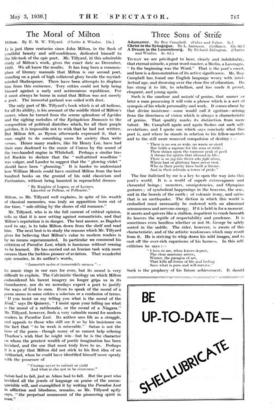The Moral of Milton
Milton. By E. M. W. Tillyard. (Chatto & Windus. 15s.)
IT is just three centuries since John Milton, in the -flush of youthful beauty and self-confidence, dedicated himself to the life-task of the epic poet. Mr. Tillyard, iii this admirable study of Milton's work, gives the exact date as December, 1629. We all know the results. It has long been a common- place of literary manuals that Milton is our second poet, standing on a peak of high collateral glory beside the myriad- minded Shakespeare: There have been attempts to displace him from this eminence. Tory critics could not help being biassed against a surly and acrimonious republican. For it must always be borne in mind that Milton was not merely a poet. The immortal garland was soiled with dust.
The only part of Mr. Tillyard's book which is at all tedious, for all its ability, is his account of the middle third of Milton's career, when he turned from the serene splendour of Lycidas and the sighing melodies of the Epitaphiuni Danionis to the composition of political diatribes which, for all their purple patches, it is impossible not to wish that he had not written: But Milton felt, as Byron afterwards expressed- it, that a man ought to do something more for society than write verses. "Hence many readers, like Sir Henry Lee, have had their ears deafened to the music of Comus by the sound of the two-handed engine in Whitehall. Perhaps a similar bias led Ruskin to declare that the "well-attired woodbine" was vulgar, and Landor to suggest that the "glowing violet" should have been " glooming." It is harder to understand how William Morris could have omitted Milton from the best hundred books on the ground of his cold classicism and Puritanism, without being haunted in reproachful dreams
"By Knights of Logres, or of Lyones, Lancelot or Pelleas, or Pellenore."
Milton, as Mr. Tillyard well explains, in spite of his wealth of classical memories, was truly an apparition born out of due time, "sole-sitting by the shores of old romance."
Mr. Tillyard, who is in the full current of critical opinion, tells us that it is now setting against romanticists, and that Milton's reputation is in danger. The best answer, as Bagehot used to say, is to take Milton down from the shelf and read him. The next best is to study the reasons which Mr. Tillyard gives for believing that Milton's value to modern readers is by no means superannuated. In particular we commend his criticism of Paradise Lost, which is luminous without ceasing to be learned. He has carried out an Icarian task with more success than the luckless pioneer of aviation. That wonderful epic remains, in its author's words, " Irnmortale ragas et inenarrabile carmen "— its music rings in our ears for ever, but its moral is very difficult to explain. The Calvinistic theology on which Milton embroidered his lucent imagery no longer grips us in its thumbscrew, nor do we nowadays expect a poet to justify the ways of God to men. Even to speak of the moral of a poem seems to some critics a solecism or a confusion of terms.
If you insist on my telling you what is the moral of the Iliad," says De Quineey, "I insist upon your telling me what is the moral of a rattlesnake, or the moral of a Niagara." Mr. Tillyard, however, finds a very valuable moral for modern readers in Paradise Lost. Its author sees life as a struggle, and appeals to those who still see it so by his insistence on the fact that "to be weak is miserable." Satan is not the hero of the poem—though many of us cannot help echoing Thurlow's wish that he might win—but he is the character on whom the greatest wealth of poetic imagination has been lavished, and the one that most truly lives to us. Perhaps it is a pity that Milton did not stick to his first idea of an Arthuriad, when he could have identified himself more openly with the possessor of
"Courage never to submit or yield . And what is else not to be overcome.'"
Satan had to fail, just as Adam had to fall. But the poet who lavished all the jewels of language on praise of the uncon- querable will, and exemplified it by writing the Paradise Lost in affliction and .blindness, remains, as Mr. Tillyard aptly says, "the perpetual monument of the pioneering spirit in man."














































 Previous page
Previous page